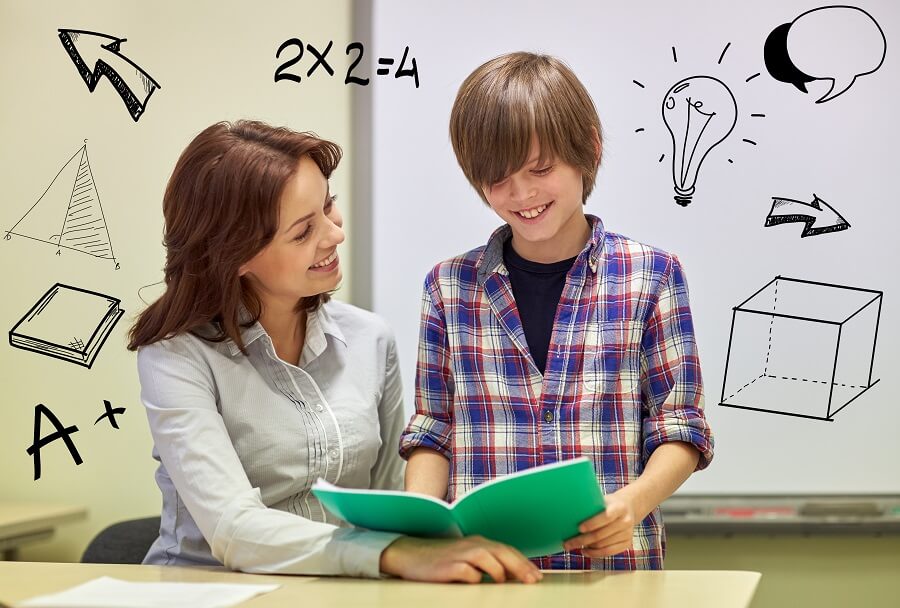
GCSE Maths lays the foundations for the important numerical and problem-solving skills your child needs for future success. Understanding key topics like numbers, fractions and ratios builds confidence and helps tackle more complex maths.
As a parent, your support is important. Encouraging a positive attitude and consistent practice can make math fun and less stressful. This guide will enable your child to succeed confidently and calmly in their GCSE Maths exams.
What is GCSE Maths?
GCSE stands for General Certificate of Secondary Education. GCSE Mathematics is a subject studied by students aged 14 to 16 in the UK, covering the mathematical skills needed for everyday life and future study. It includes subjects like numbers, algebra, geometry, probability and statistics to build problem-solving skills.
This qualification prepares students for higher education and careers by developing confidence in mathematical reasoning and real-world applications. GCSE Maths is assessed through exams tailored to different ability levels, ensuring that all students can succeed.
Why is GCSE Maths important for Your Child?
GCSE Mathematics is essential for your child's future success in education and everyday life. It builds important skills like problem solving, logical thinking and numerical confidence that go beyond the classroom. A good pass in GCSE Maths opens many doors to further study and career opportunities, making it an important step.
Here are some Importance of GCSE Maths
- Develops key life skills such as budgeting and data analysis
- Develops problem-solving and logical thinking abilities
- Many A Level courses, required for apprenticeships and jobs
- Builds confidence in dealing with practical mathematics in daily tasks
- Opens avenues for higher education and professional careers
Supporting your child in GCSE maths helps to develop a confident learner who is ready to face future challenges effectively.
GCSE Maths Exam Structure
GCSE Maths exams have a clear structure designed to assess a range of mathematical skills and knowledge. Understanding this structure can help parents support their child’s preparation with confidence.
GCSE Maths exam structure include:
- Three equally-weighted papers
- Paper 1: Non-calculator (1 hour 30 minutes)
- Papers 2 and 3: Calculator allowed (1 hour 30 minutes each)
- Each paper covers a variety of question types, from short calculations to multi-step problem solving
- Two tiers: Foundation (grades 1-5) and Higher (grades 4-9), with topics overlapping but differing in difficulty
- Exams assess core areas: Number, Algebra, Ratio & Proportion, Geometry, Probability, and Statistics.
Knowing this helps parents guide revision, encourage practice papers, and build exam confidence for child.
Key Topics Covered in GCSE Maths
GCSE Maths covers six essential topic areas that build a solid mathematical foundation for students. Understanding these topics helps your child grasp the core concepts and develop problem-solving skills needed for exams and everyday life.
- Numbers: Includes operations with whole numbers, decimals, fractions, percentages, powers, roots, and estimation techniques.
- Algebra: Focuses on expressions, equations, inequalities, sequences, and graph plotting.
- Geometry and Measures: Covers shapes, angles, area, volume, constructions, and basic trigonometry.
- Statistics and Probability: Teaches data interpretation, averages, range, and chance calculations.
- Ratios, Proportions, and Rates of Change: Involves solving problems with ratios, direct/inverse proportion, and understanding growth rates.
- Functions: Includes understanding functional notation, mapping, and simple graph analysis.
Helping your child master these topics step-by-step will boost confidence and exam readiness effectively.
How parents can support GCSE maths learning
Supporting a child’s GCSE Maths journey is about more than just helping with homework; it involves creating a positive learning environment and encouraging confidence. Your active involvement can motivate your child and make maths feel achievable, even when topics get challenging.
Practical ways to help your child learn maths
- Understand the syllabus: Familiarise yourself with the key topics your child is studying, such as number properties, algebra and geometry.
- Create a study plan: Help break down revision into manageable, focused sessions, targeting areas of weakness.
- Encourage regular practice: Maths requires hands-on work; help your child complete homework and practice past exam papers.
- Discuss and explain: Ask your child to explain their methods out loud to help them understand and strengthen communication skills.
- Encourage problem-solving: Encourage breaking down problems into smaller steps rather than memorising formulas.
- Balance support and independence: Provide guidance but let your child manage their time and tackle challenges independently.
- Be positive and patient: Celebrate progress and remind your child that mistakes are a part of learning, which can help reduce math anxiety.
With consistent encouragement and practical strategies, parents can help their children not only prepare effectively, but also build lifelong confidence in mathematics.
Every parent wants to provide the best learning opportunities for their child to succeed in GCSE Maths. If you are looking for GCSE Maths classes to suit your child’s needs, MathsAlpha offers expert tutoring for students from Year 7 to Year 11 across the UK. Our personalised approach helps build confidence and improve exam performance.
Contact us today for Maths classes in the UK. Register now to give your child the academic edge they deserve. To get started, email us at info@mathsalpha.com or call +44 7834 229046.
Recent Blogs
-

-
 04 Dec 2025
04 Dec 2025A-Level Maths Questions Students and Parents Ask
-
 18 Nov 2025
18 Nov 2025Why Do Kids Struggle with Geometry?
-
 14 Nov 2025
14 Nov 2025Who Invented Zero and How It Changed Maths
-
 11 Nov 2025
11 Nov 2025What Is A Prime Number?
-

-
 03 Oct 2025
03 Oct 2025How to Get an A* in A Level Maths
-

-
 25 Sep 2025
25 Sep 20255 Tips for Success in Maths Exams
-
 16 Sep 2025
16 Sep 2025How Maths Is Used in Everyday Life - 11 Examples
-
 05 Sep 2025
05 Sep 2025What is the Year 9 Maths Curriculum?
-
 04 Sep 2025
04 Sep 2025Algebra Guide for Parents to Support Children
-
 01 Sep 2025
01 Sep 2025A Level Maths Topics and Exam Success Guide
-
 23 Aug 2025
23 Aug 2025What is Covered in Year 7 Maths Curriculum?
-
 19 Aug 2025
19 Aug 2025Difference Between GCSE Maths and A Level Maths
-
 12 Aug 2025
12 Aug 2025How to Choose the Right Maths Tutor in the UK?










